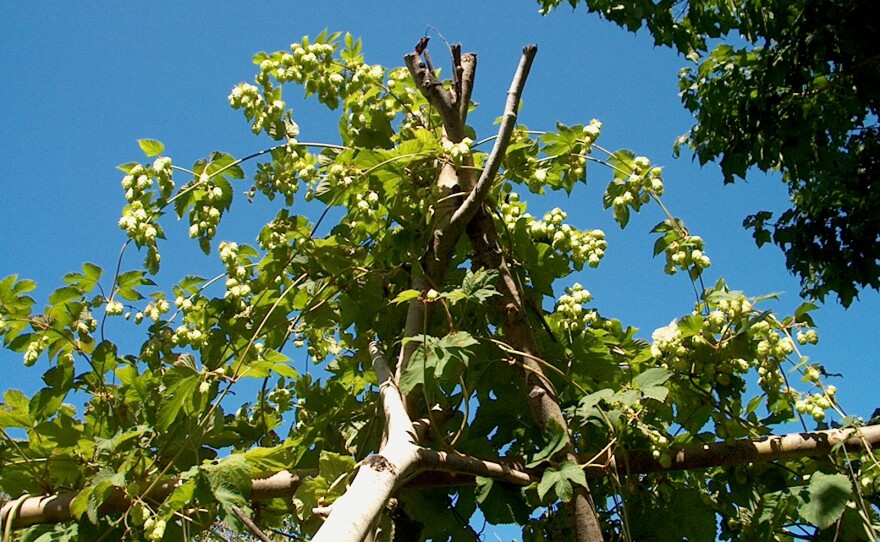
There are now more than 200 licensed breweries in Michigan. And that is starting to change the rural landscape up north.
This month, an investment group in Traverse City finalized plans to plant up to 400 acres of hops. That would roughly double the amount of hops now growing in Michigan.
And it signals the arrival of big investors into the business.
Inside Rare Bird Brewery in Traverse City, about 40 people are seated at long dining tables. They’ve paid $45 for a five-course meal, each course paired with a beer.
"I'm really surprised to say that I actually prefer the local grown hops. I think they have more aromatics and they have a slightly deeper complexity of flavor." — John Niedermaier, Traverse City brewer
John Niedermaier, who owns Brewery Terra Firma, is explaining how his Hopping Chicken Harvest Ale got its name.
"While I was picking hops, there was a chicken present and it was hopping around having a great old time. There is no chicken in the beer," he says, laughing.
He was invited to Rare Bird for his beer to be featured on the menu alongside the house selection.
Niedermaier was one of first brewers in Traverse City.
Twenty years ago, he noticed wild hops growing in his yard and started to suggest to local farmers that they try growing some cultivated varieties.
This year, about half the hops Niedermaier buys will come from Michigan.
"I’m really surprised to say that I actually prefer the local grown hops. I think they have more aromatics and they have a slightly deeper complexity of flavor. I don’t know if that’s microclimate or soil or what exactly it is but I can honestly say I prefer them," he says.
Local growing history marred by disease
He’s surprised because the hops industry, with all its growing expertise, has been concentrated in the Pacific Northwest for almost a century.
Hops grow well along the 45th parallel and were once common in Michigan and New York. But diseases like downy mildew drove the business to more arid climates out west.
Now it’s coming back, particularly to the Grand Traverse region.
"The same conditions that make it a great growing region for cherries and grapes make it a great growing region for hop and hop is a lot less vulnerable to frost [than cherries and grapes]," says Jason Warren, the president of MI Local Hops.
His investment group just bought a golf course between Traverse City and Kalkaska and will convert it into a hops farm. They might plant as many as 400 acres within the next 18 months, which would double the size of the industry in Michigan.
"We would really like to see Michigan come back to more of a powerhouse growing region for hop," adds Warren.
An expensive investment - with fast results
Until now, the hops business grew mostly in five and 10-acre increments here. Warren says investors are watching and state tax incentives are making it attractive.
It’s expensive to plant hops - more than $12,000 an acre - because of the poles and lines needed to trellis the vines. But Warren says you make money quickly.
"It's such a robust crop, you can put hop in the ground in May and have a crop in September. So it doesn’t have the seven-year or five-year waiting cycle like cherries and grapes do. The up-front investment is more but you have cash flow coming in from the crop a lot quicker."
Drought out west could drive hops growers here
MI Local Hops is not the only group investing in the Midwest hops market.
A company from Indiana called Ceres Partners recently acquired a large hops farm near Battle Creek.
![]()
Rob Sirrine, with the Michigan State University Extension office, says brewers are also interested in more geographic diversity.
"They want to make sure the raw materials are there for the craft brewers. If there was a big disaster out west, where else would they come from?"
Western states are already struggling with drought, and hops are thirsty plants. Sirrine says water shortages might drive hops expansion in Michigan in the future.
But he says right now, it's being driven by thirsty customers at local breweries.





